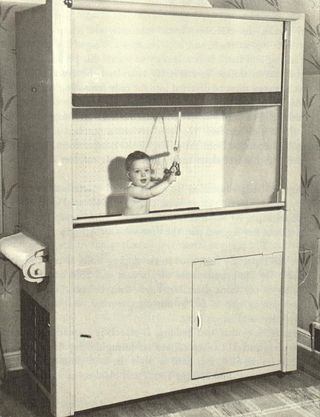I put up a post about B.F. Skinner’s daughter staunchly denying that she was raised as some sort of guinea pig in a behaviorist box. Here’s the psychologist himself refuting such claims.
You are currently browsing articles tagged Deborah Skinner Buzan.
Speaking of B.F. Skinner, his daughter, Deborah, has always vehemently denied charges that she was raised as a Behaviorist lab rat. From a 2004 Guardian article:
“My early childhood, it’s true, was certainly unusual – but I was far from unloved. I was a much cuddled baby. Call it what you will, the ‘aircrib,’ ‘baby box,’ ‘heir conditioner’ (not my father’s term) was a wonderful alternative to the cage-like cot. My father’s intentions were simple, and based on removing what he and my mother saw as the worst aspects of a baby’s typical sleeping arrangements: clothes, sheets and blankets. These not only have to be washed, but they restrict arm and leg movement and are a highly imperfect method of keeping a baby comfortable. My mother was happy. She had to give me fewer baths and of course had fewer clothes and blankets to wash, so allowing her more time to enjoy her baby.
I was very happy, too, though I must report at this stage that I remember nothing of those first two and a half years. I am told that I never once objected to being put back inside. I had a clear view through the glass front and, instead of being semi-swaddled and covered with blankets, I luxuriated semi-naked in warm, humidified air. The air was filtered but not germ-free, and when the glass front was lowered into place, the noise from me and from my parents and sister was dampened, not silenced.
I loved my father dearly. He was fantastically devoted and affectionate. But perhaps the stories about me would never have started if he had done a better job with his public image. He believed that, although our genes determine who we are, it is mostly our environment that shapes our personality. A Time magazine cover story ran the headline ‘BF Skinner says we can’t afford freedom.’ All he had said was that controls are an everyday reality – traffic lights and a police force, for instance – and that we need to organise our social structures in ways that create more positive controls and fewer aversive ones. As is clear from his utopian novel, Walden Two, the furthest thing from his mind was a totalitarian or fascist state.”

